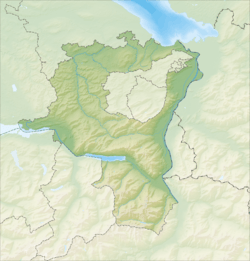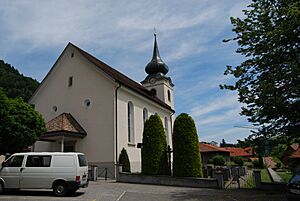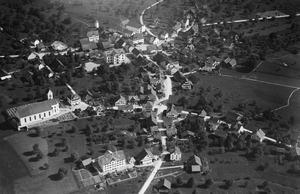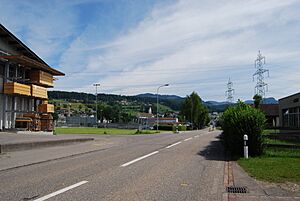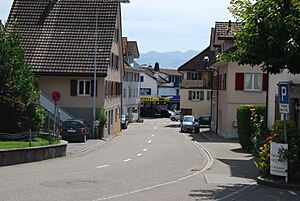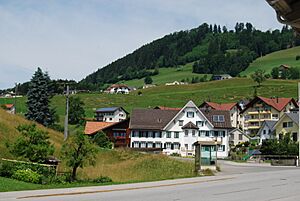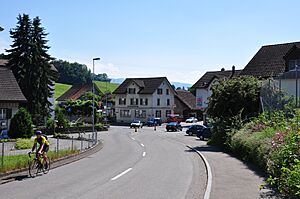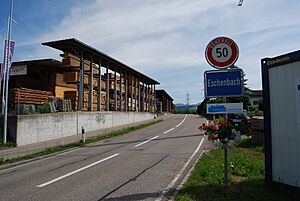Eschenbach, St. Gallen facts for kids
Quick facts for kids
Eschenbach
|
||
|---|---|---|
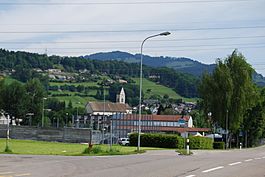 |
||
|
||
| Country | Switzerland | |
| Canton | St. Gallen | |
| District | See-Gaster | |
| Area | ||
| • Total | 54.89 km2 (21.19 sq mi) | |
| Elevation | 485 m (1,591 ft) | |
| Population
(Dec 2020 )
|
||
| • Total | 9,614 | |
| • Density | 175.150/km2 (453.64/sq mi) | |
| Postal code |
8733 / 8735 / 8638
|
|
| Surrounded by | Jona, Rüti (ZH), Schmerikon, Uznach, Wald (ZH) | |
Eschenbach is a town, also called a municipality, in Switzerland. It is located in the canton of St. Gallen.
On January 1, 2013, two smaller towns, Goldingen and St. Gallenkappel, joined with Eschenbach to form a larger municipality. This means Eschenbach is now bigger and includes these areas.
Contents
History of Eschenbach
Eschenbach has a long history! It was first mentioned in old writings way back in the year 775. Back then, it was called Esghibach. Later, in 829, it was known as Esgithorf.
History of Goldingen
The name Goldingen was used for two different small villages. The Goldingen we know today was first mentioned in 1800. Before that, it was called Thal. Another village, Vordersagen, was called Goldelingin in 1266 and was known as Goldingen until about 1700. There was also Hintersagen, which was called Hintergoldingen until around 1800.
History of St. Gallenkappel
St. Gallenkappel was first mentioned in 1275 as S. Galli capella. People in the area still call it Chappele today. This village was important because it was on two old trade and pilgrimage routes. These were paths people used to travel for trade or religious journeys.
It's thought that a chapel dedicated to Saint Gall might have stood here in the 9th century. This chapel is likely where the village got its name.
In 1830, St. Gallenkappel was a special place where people gathered. They were protesting because they felt they had lost some of their freedoms. They wanted to change the rules of their government. They asked for two main things:
- They wanted a fairer way to choose people for their local government. They felt the capital city had too much power.
- They wanted a way for citizens to suggest changes to the laws. At that time, it was very hard to change the laws.
These protests were peaceful. The government listened and quickly agreed to their demands. This led to a time of big changes in Switzerland, which helped create the modern Swiss Federal State in 1848.
Geography of Eschenbach
The larger municipality of Eschenbach now covers a total area of about 54.86 square kilometers (about 21.18 square miles).
A big part of Eschenbach's land is used for farming (about 61.9%). A good portion is covered by forests (21.9%). The rest of the land (15%) has buildings or roads, and a small part (1.1%) is made up of rivers or lakes.
Eschenbach includes the main village of Eschenbach and several smaller villages called hamlets. These hamlets are Bürg, Diemberg, Ermenswil, Länziken, Lütschbach, and Neuhaus.
Goldingen, before it joined Eschenbach, was about 22.1 square kilometers (8.5 square miles). Most of its land was also used for farming (50.7%) or covered in forests (45.1%). It included hamlets like Echeltschwil and Hubertingen.
St. Gallenkappel, before the merger, was about 19.5 square kilometers (7.5 square miles). It was located near the Ricken Pass. Most of its land was for farming (59.5%) or forests (34.9%). It included the village of St. Gallenkappel and hamlets like Bezikon and Rüeterswil.
Coat of Arms
The coat of arms for Eschenbach is a red rose on a gold background. It's a simple and pretty design!
People of Eschenbach (Demographics)
Eschenbach has a population of about 8,606 people (as of December 2011). About 16.8% of the people living here are from other countries. Many different languages are spoken, but most people (88.8%) speak German. Other languages like Albanian and Italian are also spoken.
The population includes many young people. About 14.5% are children aged 0-9, and 15% are teenagers aged 10-19.
Most people in Eschenbach live in families. About 64.5% of households are couples with children.
In the 2007 national election, the most popular political party was the SVP.
Many adults in Eschenbach have finished higher education. About 67.5% of people aged 25 to 64 have completed either high school or gone on to college or a special technical school.
Historic Population
This chart shows how the population of Eschenbach, Goldingen, and St. Gallenkappel changed over time before they merged.
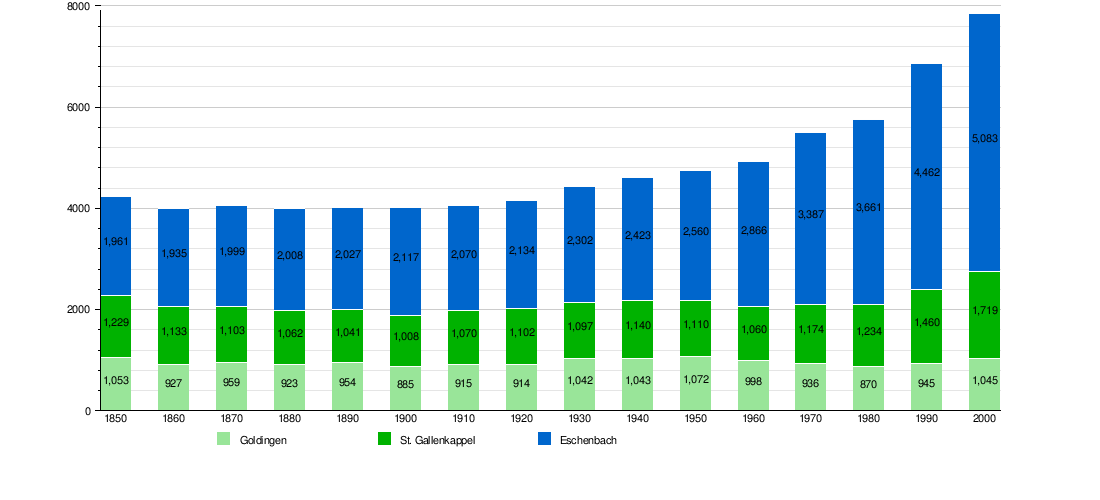
Important Historic Sites
Eschenbach has some important historic places. The Kusterhaus (a special old house) in Eschenbach and the ruins of Fründsberg in Goldingen are listed as important Swiss heritage sites. This means they are protected because of their history and cultural value.
Economy of Eschenbach
Eschenbach has a healthy economy. In 2007, the unemployment rate was low, at 1.3%. This means most people who wanted to work had jobs.
The town has different types of businesses:
- Primary sector: This includes jobs like farming and forestry. About 186 people work in this area.
- Secondary sector: This involves making things, like in factories or construction. About 1,640 people work here.
- Tertiary sector: This is about services, like shops, offices, and schools. About 703 people work in this sector.
Many people who live in Eschenbach also work there. Others travel to nearby towns for work, and some people travel into Eschenbach to work.
Religion in Eschenbach
Based on a census from 2000, most people in Eschenbach are Roman Catholic (about 65.4%). The next largest group belongs to the Swiss Reformed Church (about 16.5%). There are also people who belong to other Christian churches, the Orthodox Church, and Islam. A smaller number of people do not belong to any church or have other beliefs.
See also
 In Spanish: Eschenbach (San Galo) para niños
In Spanish: Eschenbach (San Galo) para niños
 | Emma Amos |
 | Edward Mitchell Bannister |
 | Larry D. Alexander |
 | Ernie Barnes |




